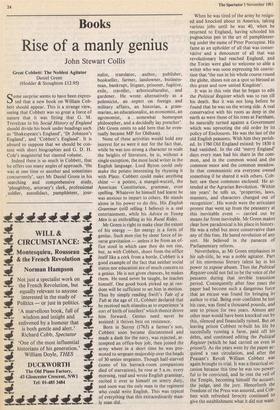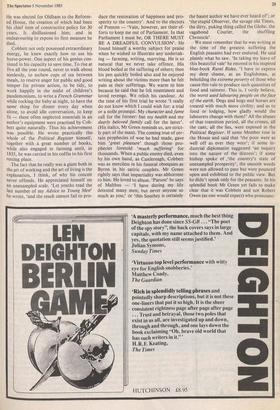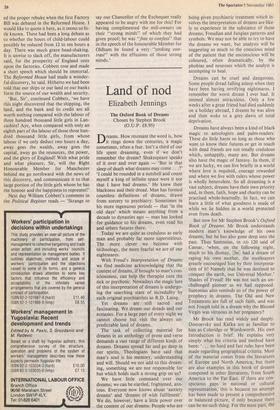Books
Rise of a manly genius
John Stewart Collis
Great Cobbett: The Noblest Agitator Daniel Green
(Hodder & Stoughton £12.95)
Some surprise seems to have been expres- sed that a new book on William Cob- bett should appear. This is a strange view, seeing that Cobbett was so great a force of nature that it was fitting that G. M. Trevelyan in his Social History of England should divide his book under headings such as 'Shakespeare's England', 'Dr Johnson's England', and `Cobbett's England'. It is absurd to suppose that we should be con- tent with short biographies and G. D. H. Cole's magisterial but slanted volume.
Indeed there is so much in Cobbett, that he offers too many angles of approach. 'He was at one time or another and sometimes concurrently', says Mr Daniel Green in his searching and comprehensive study, `ploughboy, attorney's clerk, professional _soldier, autodidact, pamphleteer, jour- nalist, translator, author, publisher, bookseller, farmer, landowner, business- man, bankrupt, litigant, prisoner, fugitive, exile, traveller, arboriculturalist, and gardener. He wrote alternatively as a polemicist, an expert on foreign and military affairs, an historian, a gram- marian, an educationalist, an economist, an agronomist, a somewhat homespun philosopher, and a decidedly lay preacher'. (Mr Green omits to add here that he even- tually became MP for Oldham).
None of these activities would hold any interest for us were it not for the fact that, while he was too strong a character to scale the heights of literature, he is, without a single exception, the most lucid writer in the English language. Lord Byron could only make the potato interesting by rhyming it with Plato. Cobbett could make anything shine — a potato, a mangel-wurzel, the American Constitution, grammar, even spelling. Whatever he himself had learnt he was anxious to impart to others. He stands alone in his power to do this. His English Grammar (still selling 1 believe) is a real entertainment, while his Advice to Young Men is as enthralling as his Rural Rides.
Mr Green is right to make clear the extent of his energy — for energy is a form of genius. Such men rise by sheer force of in- verse gravitation — unless it be from an of- fice stool in which case they do not rise, but, as with Cobbett, shoot from the office itself like a cork from a bottle. Cobbett is a good example of the fact that neither social status nor education are of much concern to a genius. He is not given chances, he makes them. He need never be taught, he teaches himself. One good book picked up at ran- dom will be sufficient to set him in motion. Thus by simply reading Swift's Tale of a Tub at the age of 11, Cobbett declared that he received such stimulus as to experience 'a sort of birth of intellect' which thence drove him forward. Genius need never be assisted: it thrives best on resistance.
Born in Surrey (1763) a farmer's son, Cobbett soon became discontented and made a dash for the navy, was rejected, at- tempted an office-boy job, then joined the army where in a short time he was pro- moted to sergeant-majorship over the heads of 30 senior sergeants. Though half-starved (some of his barrack-room companions died of starvation), he rose at 5 a.m. every morning, read and wrote English grammar, recited it over to himself on sentry duty, and soon was the only man in the regiment who could write English. This was typical of everything that this extraordinarily man- ly man did. When he was tired of the army he resign- ed and knocked about in America, taking various jobs until he was 40, when he returned to England, having schooled his pugnacious pen in the art of pamphleteer- ing under the name of Peter Porcupine. His fame as an upholder of all that was conser- vative and a denouncer of all that was revolutionary had reached England, and the Tories were glad to welcome so able a writer who was soon expressing his convic- tion that 'the sun in his whole course round the globe, shines not on a spot so blessed as this great and now united Kingdom'.
It was in this vein that he began to edit the Political Register which was to run till his death. But it was not long before he found that he was on the wrong side. A real conservative with his roots as deep in the earth as were those of his trees at Farnham, he naturally turned against a Government which was uprooting the old order by its policy of Enclosures. He was the last of the old English peasants. With him they perish- ed. In 1760 Old England existed: by 1830 it had vanished. In the old 'merry England' days every man had his share in the com- mon, and in the common wood and the common moor and the common meadow. In that communistic era everyone owned something if he shared it with others. Cob- bett saw these commons enclosed. He at- tended at the Agrarian Revolution. 'Within ten years' he tells us, 'properties, laws, manners, and characters changed out of recognition'. His words were the articulate protest that went up from the peasantry at this inevitable event — carried out by means far from inevitable. Mr Green makes clear how paradoxical is his place in history. He was a rebel but more conservative than any of this foes. He hated revolution of any sort. He believed in the panacea of Parliamentary reform.
Nevertheless, as Mr Green emphasises in his sub-title, he was a noble agitator. Part of his enormous literary talent lay in his power to expose abuses. Thus the Political Register could not fail to be the voice of the peasants during that terrible transition period. Consequently after four years the paper had become such a dangerous force that an excuse was found for bringing its author to trial. Being over-confident he lost his case, was fined a thousand pounds, and sent to prison for two years. Almost any other man would have been knocked out by this, silenced and financially ruined. But on leaving prison Cobbett re-built his life by succesfully running a farm, paid off his debts, and continued editing the Political Register (which he had carried on even in prison!). As the years went by the paper ac- quired a vast circulation, and after the Peasant's Revolt William Cobbett was again brought to trial. It was a theatrical oc- casion because this time he was too power- ful to be convicted, and he rent the veil of
the Temple, becoming himself the accuser, the judge, and the jury. Henceforth the freedom of the Press was assured, and Cob- bett with refreshed ferocity continued to give the establishment what it did not want. He was elected for Oldham to the Reform- ed House, the creation of which had been his chief item of constructive policy for 30 years. It disillusioned him; and in endeavouring to expose its first measure he died.
Cobbett not only possessed extraordinary energy, he knew exactly how to use his horse-power. One aspect of his genius con- sisted in his capacity to save time. To rise at five all the year round, never to walk about aimlessly, to eschew cups of tea between meals, to reserve anger for public and good temper for private action, to be tidy, to work happily in the midst of children's pandemonium, to write a French Grammar while rocking the baby at night, to have the same thing for dinner every day when alone, to avoid idle conversation, to keep fit — these often neglected essentials in an author's equipment were practised by Cob- bett quite naturally. Thus his achievement was possible. He wrote practically the. whole of the Political Register himself, together with a great number of books, while also engaged in farming until, in 1835, he was carried in his coffin to his first resting place.
The fact that he really was a giant both in the art of working and the art of living is the explanation, I think, of why his conceit never offends. He appreciated himself on an unexampled scale. 'Let youths read the last number of my Advice to Young Men' he wrote, 'and the result cannot fail to pro- duce the restoration of happiness and pro- sperity to the country'. And to the electors of Preston — 'Vain, however, are their ef- forts to keep me out of Parliament. In that Parliament I must be, OR THERE MUST BE A DREADFUL CONVULSION'. He found himself a worthy subject for praise when he wished to illustrate any undertak- ing — farming, writing, marrying. He is so natural that we never take offence. His blood boiled at the suffering of others; then his pen quickly boiled also and he enjoyed writing about the victims more than he felt pain at their sufferings. We warm to him because he said that he felt resentment and loved revenge. We relish his candour. At the time of his first trial he wrote 'I really do not know which I could wish for: a trial or a nolle prosequi. My character and fame call for the former: but my health and my dearly beloved family call for the latter'. (His italics, Mr Green reminds us, are strict- ly part of the man). The coming true of cer- tain prophecies of woe he had made, gave him 'great pleasure' though those pro- phecies foretold 'much suffering' for thousands. When a public enemy died, even by his own hand, as Castlereagh, Cobbett was as merciless in his funeral obsequies as Byron in his satiric couplets. Mr Green rightly says that impartiality was abhorrent to him. He loved to abuse. 'Parson' he says of Malthus — 'I have during my life detested many men; but never anyone so much as you;' or 'this Southey is certainly
the basest author we have ever heard of or 'the stupid Observer, the savage old Times, the dirty, puking thing called the Globe, the vagabond Courier, the shuffling Chronicle'.
We must remember that he was writing at the time of the greatest suffering the English peasants had ever endured. He said plainly what he saw. 'In taking my leave of this beautiful vale' he entered in his inspired blue-book Rural Rides, 'I have to express my deep shame, as an Englishman, at beholding the extreme poverty of those who cause this vale to produce such quantities of food and raiment. This is, I verily believe, the worst used labouring people on the face of the earth. Dogs and hogs and horses are treated with much more civility; and as to food or lodging, how gladly would the labourers change with them!' All the abuses of that transition period, all the crimes, all the cant, all the lies, were exposed in the Political Register. If some Member rose in the House and said that 'the poor were as well off as ever they were'; if some in- dustrial diplomatist suggested 'an inquiry into the nature of the distress'; if some bishop spoke of ,'the country's state of unexampled prosperity', the smooth words were not allowed to pass but were pounced upon and exhibited to the public view. But he didn't speak only for the peasants. In his splendid book Mr Green yet fails to make clear that it was Cobbett and not Robert Owen (as one would expect) who pronounc-
ed the proper rebuke when the first Factory Bill was debated in the Reformed House. I would like to quote it here, as it seems so lit- tle known. There had been a long debate as to whether the hours of child-labour could possibly be reduced from 12 to ten hours a day. There was much grave head-shaking. It is unwise to slack off, the manufacturers said, for the prosperity of England rests upon the factories. Cobbett rose and made a short speech which should be immortal. The Reformed House had made a wonder- ful discovery, he said. Hitherto we had been told that our ships or our land or our banks form the source of our wealth and security.
'But, Sir', continued Cobbett, 'we have this night discovered that the shipping, the land, and the bank and its credit are all worth nothing compared with the labour of three hundred thousand little girls in Lan- cashire! Aye, when compared with only an eighth part of the labour of those three hun- dred thousand little girls, from whose labour if we only deduct two hours a day, away goes the wealth, away goes the capital, away go the resources, the power, and the glory of England! With what pride and what pleasure, Sir, will the Right Honourable Member for Manchester behind me go northward with the news of this discovery, and communicate it to that large portion of the little girls whom he has the honour and the happiness to represent!'
Next day William Cobbett's comment in the Political Register reads — 'Strange to say our Chancellor of the Exchequer really appeared to be angry with me for this! For having complimented the mill-owners on their "strong minds" of which they had given proof; he was "free to confess" that in the speech of the honourable Member for Oldham he found a very "striking con- trast" with the effusions of those strong minds.'
















































 Previous page
Previous page